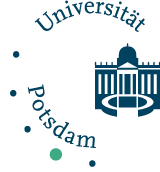Doctoral Researchers

Michaela Böhme
Master of Public Management and Governance
Campus Griebnitzsee
DFG-Research Training Group "WIPCAD"
University of Potsdam
Department of Economics
and Social Sciences
August-Bebel-Straße 89
14482 Potsdam, Germany
Office: Campus Griebnitzsee, House 7,
Room 3.07.211-15
Research topic
“Institutionalisierung von Wissensstrukturen in den deutschen Kultusverwaltungen”
Curriculum vitae
ACADEMIC TRAINING
2010 – 2012
M.A. Public Management and Governance, Zeppelin University, Germany
Thesis: New Public Management reform in the German education system – causes and implications of unintended consequences
2006 – 2010
B.A. Politics and Administration, University of Potsdam, Germany
Thesis: The Democratic Deficit of the European Union after the Lisbon Treaty
PROFESSIONAL EXPERIENCE
2012 – 2013
Consultant, Public One GmbH & Co. KG, Germany
2011
Intern, Permanent Representation of Germany to the EU, Belgium
2011 – 2012
Student assistant, Chair of Public Administration, Zeppelin University, Germany
2010 – 2012
Student assistant, Civil Society Center | CiSoC, Zeppelin University, Germany
2010
Intern, CASE – Center for Social and Economic Research, Poland
2008
Intern, Federal Ministry of Education and Research, Germany
2007 – 2009
Student assistant, Rundfunk Berlin Brandenburg (“Abendschau”), Germany
SCHOLARSHIPS & CONFERENCES
- German Research Foundation (DFG) Doctoral Studies Grant (2013 – 2016)
- Behördenspiegel Master Scholarship (2010 – 2012)
- Leonardo da Vinci Internship Scholarship (2010)
Abstract
The influence of policy information on policy change in the German school education sector
Evidence-based policy instruments have increasingly been introduced to the German education sector, triggered by the so-called TIMMA and PISA shock in 1997 and 2000. In 2006, the Federal States committed to participate in the Comprehensive Strategy for Educational Monitoring, including (1) international student assessments, (2) comparative assessments of the achievement of the education standards in the so-called National Assessment Study, (3) comprehensive VERA tests as well as (4) joint reporting of the Länder and the Federal Government. These tools are cost and time consuming and the question arises, if they fulfill their intended purpose.
The rather negative rhetoric concerning the use of such policy knowledge in the literature does not recognize the fact that a lot of change already occurred on a policy, organizational and structural level. Examples are the changed role of the school supervising authorities from controlling to advisory bodies or the new cooperation between administration and research/academia. In Bavaria, for instance, new instruments of external and internal school evaluation have been established. Moreover, individual pilot projects are conducted by the states and revealed problems could partially be solved. Examples include professionalization measures for English teachers in the state of Brandenburg as a reaction to the Ländervergleich 2009 (state comparison 2009) or the decrease of in the number of school repeaters in Rhineland-Palatine since PISA-E 2000. Finally, almost all the States do have quality agencies and monitoring reports by now.
Using an explorative and mainly qualitative approach, my first contribution will be a systematization of the changes in school education policies in the states of Bavaria, Saxony, Brandenburg and (Schleswig-Holstein) between 2003 and 2013. Next, I will investigate if evaluation information had an influence on those new developments. Most research on the use of information refers to use as a dependent variable and examines what factors foster use, for example timeliness or quality of reports. Conceptualizing the use of information as an independent variable, I seek to answer the question which information was included and excluded and how the information got into the policy process. Therefore, I will conduct interviews in state-level ministries of education and their subordinate authorities (agency level).

